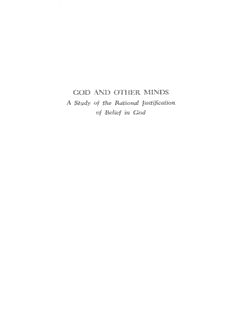
God and Other Minds : A Study of the Rational Justification of Belief in God PDF
Preview God and Other Minds : A Study of the Rational Justification of Belief in God
GOD AND OTHER MINDS A Study of the Rational Justification of Belief in God CONTEMPORARY PHILOSOPHY General Editor Max Black, Cornell University Editorial Committee Charles A. Baylis, Duke University William Frankena, University of Michigan Morton White, Harvard University Induction and Hypothesis: A Study of the Logic of Confirmation. By S. F. Barker. Perceiving: A Philosophical Study. By Roderick M. Chisholm. The Moral Point of View: A Rational Basis of Ethics. By Kurt Baier. Religious Belief. By C. B. Martin. Knowledge and Belief: An Introduction to the Logic of the Two Notions. By Jaakko Hintikka. Reference and Generality: An Examination of Some Medieval and Modern Theories. By Peter Thomas Geach. Self-Knowledge and Self-Identity. By Sydney Shoemaker. God and Other Minds: A Study of the Rational Justification of Belief in God. By Alvin Plantinga. GOD AND OTHER MINDS A Study of the Rational Justification of Belief in God By Alvin Plantinga Cornell University Press ITHACA AND LONDON Copyright © 1967 by Cornell University All rights reserved. Except for brief quotations in a review, this book, or parts thereof, must not be reproduced in any form without permission in writing from the publisher. For information address Cornell University Press, 124 Roberts Place, Ithaca, New York 14850. First published 1967 by Cornell University Press. Published in the United Kingdom by Cornell University Press Ltd., 2-4 Brook Street, London W1Y 1AA Second printing 1969 Third printing 2972 Fourth printing 1975 Library of Congress Catalog Card Number 67-20519 International Standard Book Number 0-8014-0338-3 PRINTED IN THE UNITED STATES OF AMERICA To Kathleen Preface IN this study I set out to investigate the rational justification of belief in the existence of God as He is conceived in the Hebrew-Christian tradition. Part I examines natural theology, an important traditional approach to this matter, by consider- ing in turn the cosmological, ontological, and teleological argu- ments for the existence of God. These arguments are, I believe, worthy of serious and detailed study; and the last one is not, perhaps, completely without promise. Nevertheless it is open to a serious objection (developed in Chapter Four); along with natural theology generally it must finally be judged unsuccess- ful. Part II considers natural atheology, the attempt, roughly, to show that, given what we know, it is impossible or unlikely that God exists. Here I consider the problem of evil, verifica- tionism, the paradox of omnipotence, and an ontological dis- proof of God's existence. None of these survives close scrutiny; VII Preface the verdict must be that natural atheology is no more success- ful than natural theology. Since neither natural theology nor natural atheology offers a satisfying solution to the problem at hand, I try in Part III another approach to it by exploring its analogies and connec- tions with a similar question—the "problem of other minds." In Chapters Eight and Nine, I defend the analogical argument for other minds against current criticism and argue that it is as good an answer as we have to the question of other minds. But in Chapter Ten it turns out that the analogical argument finally succumbs to a malady exactly resembling the one afflict- ing the teleological argument. I conclude that belief in other minds and belief in God are in the same epistemological boat; hence if either is rational, so is the other. But obviously the former is rational; so, therefore, is the latter. My thanks are due to Professor Max Black for helpful edi- torial suggestions, and to George G. Harper, who read the en- tire manuscript and saved me from much stylistic gaucherie. My thanks also to the Journal of Philosophy for permission to incorporate a few paragraphs of "Kant's Objection to the On- tological Argument" (LXIII [1966]) in Chapter Two; to the Philosophical Review for permission to reprint "A Valid On- tological Argument?" (LXX [1961]) as part of Chapter Two; to the Review of Metaphysics for permission to reprint brief portions of "Things and Persons" (XIV [1961]) in Chapters Eight and Nine as well as sections of "Induction and Other Minds" (XX [1966]), which here appear as parts of Chapters Eight and Ten; and to Cornell University Press and George Allen & Unwin Ltd for permission to include in Chapter Six a revised version of "The Free Will Defence," which originally appeared in Philosophy in America, Max Black, editor (Ithaca and London, 1965). viii Preface I take this opportunity to record my abiding gratitude to sev- eral of my teachers, including Cornelius A. Plantinga, William K. Frankena, and Henry Stob. I must make special mention of William Harry Jellema, whose magnificent teaching and think- ing kindled my enthusiasm for philosophy and have served as models ever since. In writing this book I have had the benefit of stimulating discussion and penetrating criticism from a large number of friends, colleagues, and students—especially William P. Alston, Charles Landesman, Jr., Ian Mueller, and Nicholas Wolter- storff. I am particularly eager to acknowledge my indebtedness to the members and former members of the Wayne philosophy department—especially Richard L. Cartwright, Hector Casta- fieda, George Nakhnikian, and (perhaps most of all) Edmund L. Gettier, III, and Robert C. Sleigh, Jr. It would be hard to overestimate their contribution to this book; I have learned more from them than I can say. ALVIN PLANTINGA Calvin College Grand Rapids, Michigan January ig6y IX
